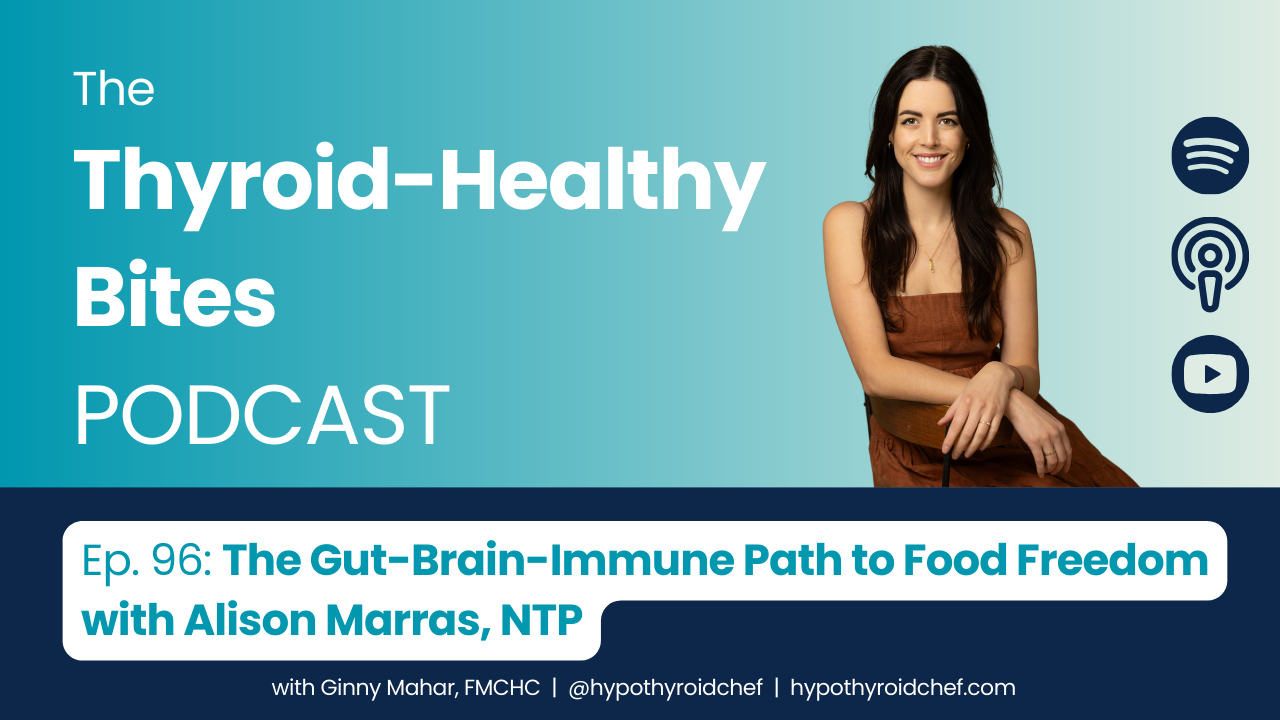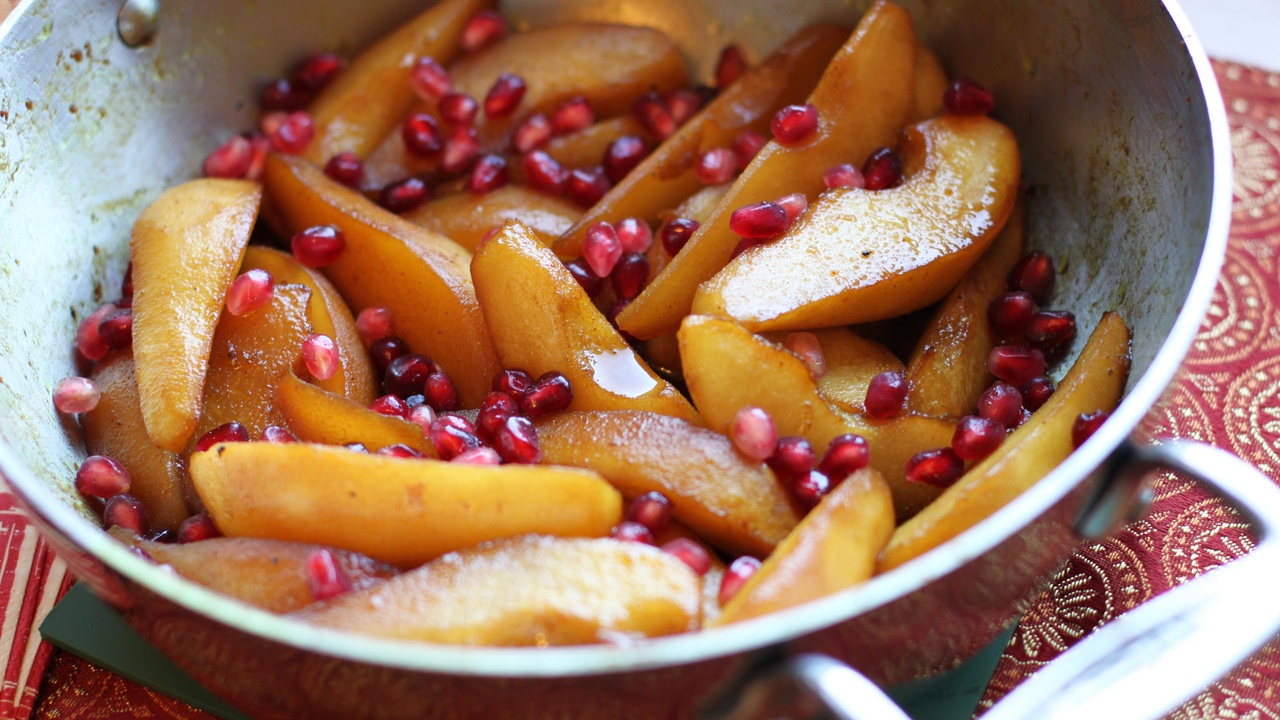Top 5 Detoxifying Foods for Thyroid Thrivers
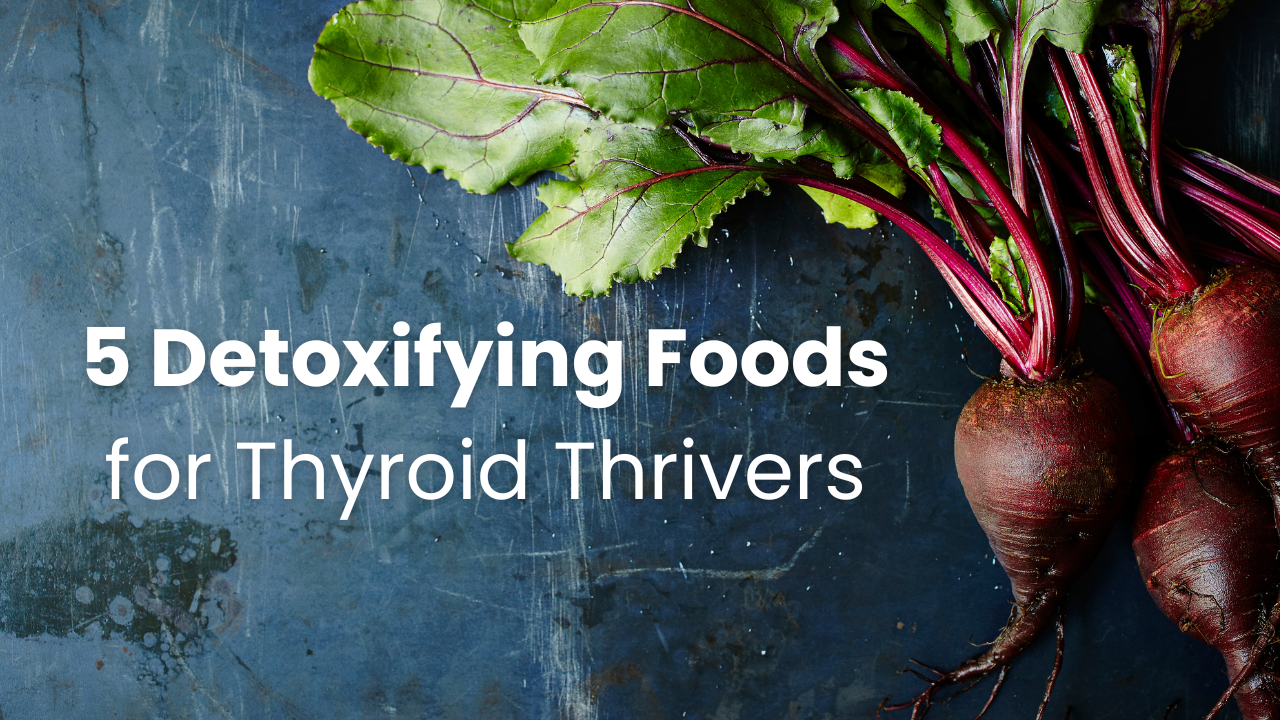
There are countless surprising and increasing sources of toxins in our lives. These toxins can negatively impact how our thyroid functions, how we metabolize our thyroid meds, and how we convert inactive T4 thyroid hormone to active T3. This is why it's so important to support our detox pathways through the foods we eat.
In this blog post and episode of Thyroid-healthy Bites, I'll share my 5 Favorite Detoxifying Foods for Thyroid Thrivers. First, we’ll look deeper into WHY this is important for our thyroid health. Then, we’ll look at each of these five foods, along with ways you can incorporate more of them into your diet. This one will help you dial up the power of your thyroid-healthy diet, so be sure to read to the end!
Disclaimer: This information is for educational and informational purposes only. Always consult with your doctor or other qualified healthcare providers before making changes to your diet, health care, or exercise regimen.
We'll Discuss:
- Why detoxification is important
- Why a gentle approach is best
- Why I chose these five foods
- The Top 5 detoxifying foods for Thyroid Thrivers
- Easy and delicious ways to incorporate these foods
Podcast Links:
- Subscribe on iTunes
- Follow on Spotify
- Subscribe on YouTube
- Subscribe on Google Podcasts
- Listen on the podcast page
Why Are Detoxifying Foods Helpful for Thyroid Thrivers?
Avoiding toxins can be hard in the modern world, where things like pesticides, toxic chemicals, and heavy metals are everywhere. A nutrient-dense, colorful, and diverse diet of whole, organic foods can help protect our bodies from the negative effects of so many unavoidable toxins. It can also help keep our detox pathways healthy and high-functioning.
The thyroid is highly affected by toxic chemical buildup in our bodies from the environment. For example, studies have found that people with higher levels of PFOAs in their blood (commonly found in non-stick cookware) were more than twice as likely to have thyroid disease.
Another source of toxins is conventional (non-organic) produce. 60% of common pesticides and fertilizers have been shown to affect the thyroid’s ability to produce thyroid hormone. This is why organic foods are ideal when it comes to thyroid-healthy eating.
These are just a couple of examples among far too many, but they underscore the importance of avoiding toxins and supporting our body's built-in detox pathways to protect our thyroid health. Our bodies do a good job of detoxification on their own, and harsh "detoxes" can do a lot more harm than good. Still, one powerful way to optimize, protect, and support those built-in detox pathways in a world where our toxin load is higher than ever is through the foods we eat.
It's especially important to pay attention to our liver health if we suffer from thyroid issues. The liver is our body's main detoxification plant, but it also plays a big role in our overall thyroid function. Up to 60% of thyroid hormone conversion takes place in the liver. The liver is also responsible for detoxifying thyroid-suppressive hormones like estrogen and cortisol. In short, if you want a healthy thyroid, you need a healthy liver!
Incorporating Detoxifying Foods vs. "Detoxes"
This one's important, Thyroid Thrivers, so listen up.
For people with thyroid issues, a gentle approach to supporting our built-in detox pathways is important to help prevent further damage or worsening symptoms.
We do this by supporting the organs that do the work of detoxification by eating a colorful, organic, nutrient-dense diet, getting quality sleep, drinking plenty of water, sweating regularly through exercise, and having daily bowel movements.
This post features a list of 5 favorite foods that support your body's natural detoxification pathways to function optimally. Eating these foods as part of a diverse, well-balanced diet in reasonable amounts can help your body rid itself of harmful toxins by supporting those detox pathways.
That is what we're talking about here. We're not talking about making a smoothie from these five ingredients and drinking it exclusively for a week to "detox." Please, don't take this information to that extreme place. It's not a good idea. Here's why:
"Cleanses," "detoxes," and "detox-in-a-box" products that claim to purge the body of toxins can have negative effects. They tend to be nutrient deficient, sometimes high in sugar, low in fiber, and alarmingly low in calories. This caution also applies to aggressive dietary detoxes, which can overstress the body.
Intensive detoxes can lead to issues such as autoimmune flare-ups, symptom flare-ups, severe die-off reactions, and inflammation. If intensive detoxification is needed, it should only be done under the careful guidance of your doctor or other qualified healthcare provider.
Now that we've clarified that, let's dive in...
My 5 Favorite Detoxifying Foods for Thyroid Thrivers
Before we dive in, please know that there are plenty of wonderfully health-supportive and detoxifying foods that are not on this list. I selected these five foods specifically for Thyroid Thrivers based on these criteria:
- They're tolerated by most of us.
- They are compliant with the Autoimmune Protocol (AIP) elimination diet.
- They exclude foods high in iodine which is necessary for thyroid function but can also be problematic when consumed in excess.
- They feature benefits that can directly support our thyroid function.
- They have no purported thyroid-inhibiting properties, such as goitrogens.*
*Note: Consuming goitrogens in reasonable quantities, especially when cooked, is not harmful to most thyroid or autoimmune thyroid patients. Many of these so-called goitrogenic foods, like cruciferous vegetables, are highly nutritious, beneficial, and support detoxification. Still, I have excluded them from this list for those who struggle with these foods for various reasons, including sulfur, oxalates, or salicylates.
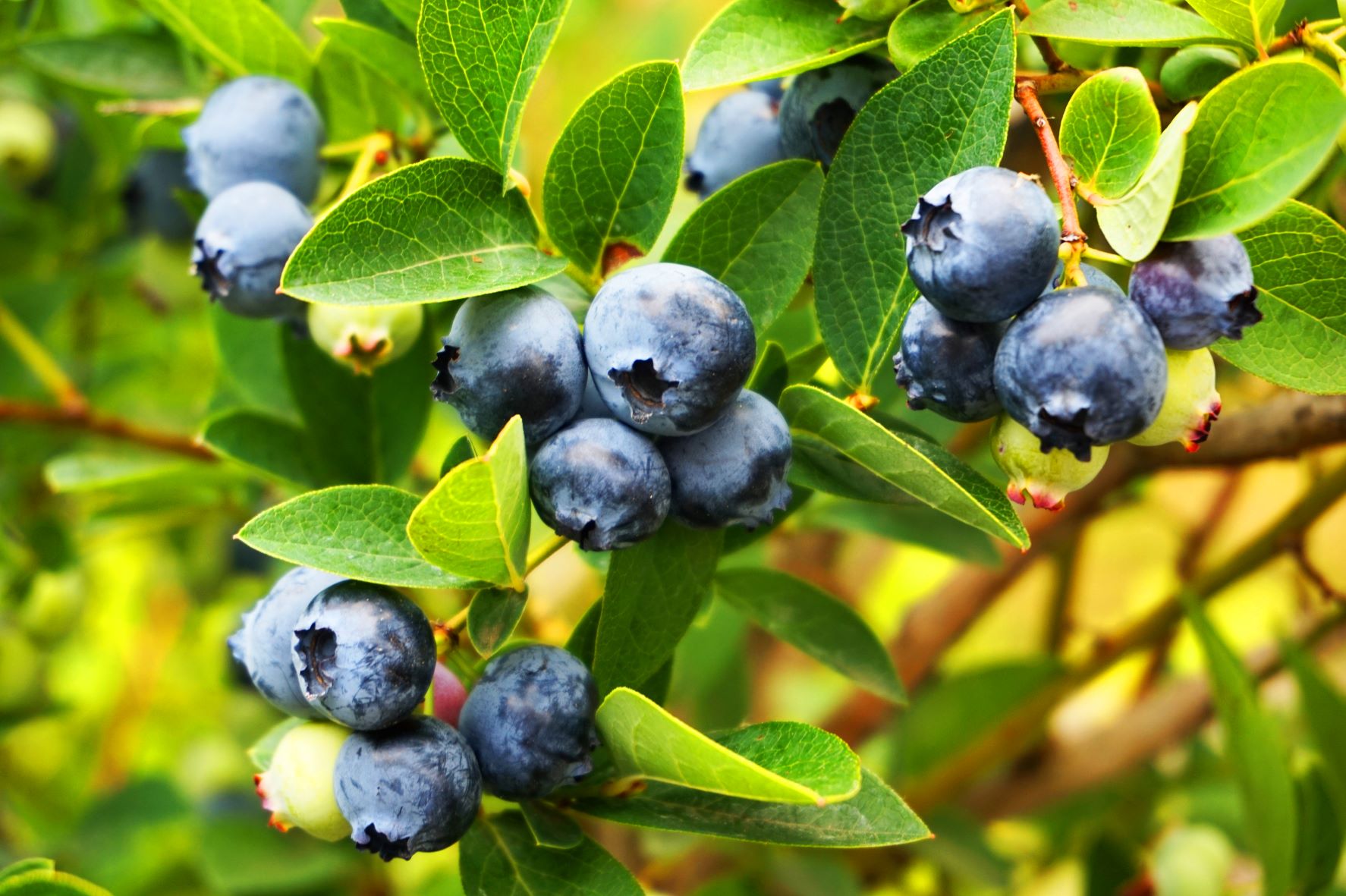
1) Blueberries
Powerful antioxidants are the name of the game for blueberries. Antioxidants protect our cells from oxidation, a chemical process that happens daily and can cause damage to our cells. Oxidation is one of many negative effects of dietary or environmental toxins.
One of the best ways to protect ourselves from oxidation is by consuming antioxidants. Blueberries have the HIGHEST antioxidant levels of any commonly consumed fruit or vegetable. This helps protect our DNA, our longevity, our brain, our heart, and all systems of the body, including our thyroid.
An added benefit is their color-- blue, a rare one in the diet. Various colors in the diet provide us with various polyphenols, and blueberries feature loads of these, specifically anthocyanins. Anthocyanins possess anti-inflammatory, anti-cancer, anti-obesity, anti-diabetes, and antimicrobial effects, just to name a few.
All of these special characteristics of blueberries help make them a great food to support your liver, your kidneys, your digestion, your muscles, and your cells. In other words, blueberries are a great food to incorporate into your routine.
If you're worried about the sugar in blueberries, this may give you peace of mind: Besides being relatively low in sugar compared to other fruits, their amazing antioxidants have been shown to improve sugar metabolism and insulin sensitivity.
If you want to eat blueberries with the highest levels of beneficial antioxidants, polyphenols, and anthocyanins, check the freezer aisle for organic wild blueberries. While smaller in size, wild blueberries feature twice the antioxidants, twice the fiber, one-third less sugar, and in my opinion, double the flavor! They make delicious smoothies.
Whole, fresh, organic blueberries are an easy thyroid-friendly snack. To try an AIP dessert featuring frozen wild blueberries, check out my recipe for Blueberries & Lemon Cream.

2) Cilantro
Did you know that cilantro is a powerful detoxifying herb? Or that it can help stabilize blood sugar, fight infection, protect the heart, reduce anxiety, and help you sleep? These are just a few of the benefits that abound in Cilantro (aka Chinese Parsley) and the seed form of cilantro, commonly referred to as coriander.
Here, we’re going to focus on the natural chelating abilities of cilantro, or in other words, its ability to help remove heavy metals from our tissues. This is especially important for thyroid patients because heavy metal toxicity in the body (from substances like lead, mercury, aluminum, cadmium, and arsenic) is closely intertwined with our thyroid health.
Studies have shown a direct link between mercury exposure and an increase in thyroid antibodies.
Heavy metals set up camp in our tissues, where they get stored along with other toxins. This is especially true for our thyroid tissue because the thyroid metabolizes things quickly; therefore, more toxins pass through it. Sometimes those toxins are so chemically similar to iodine, which is utilized by the thyroid to make thyroid hormone, that the thyroid absorbs them.
One study has shown that cilantro helps protect against the damage of lead, while another shows that cilantro removes heavy metals from the body. In other words, cilantro is a natural chelator that is gentle and easy on the body. Again, we're talking about incorporating cilantro into a well-balanced diet in reasonable amounts, not extreme amounts.
Further Reading: How Cilantro Can Help You Detox
Cilantro can be so much more than just a garnish. These mouth-watering recipes make it easy to add more cilantro to your thyroid-friendly diet.
- Chicken Cilantro: This recipe takes the cake as far as cilantro-centric cooking goes.
- Thai Chicken Soup with Coconut Milk: This delicious soup is quick, easy, and full of bright flavors.
- Hearty AIP Breakfast Bowl: Packed with anti-inflammatory goodness, this breakfast bowl will get you ready to take on the day.
- Thai Beef Salad: This entrée salad is salty, sour, spicy, sweet, colorful, crunchy, and just plain good.
3) Turmeric
This ancient Ayurvedic spice is not only nature’s anti-inflammatory but is also a strong player in detoxing the liver. Inflammation will tell the body to hold on to fluids. When fluids are not regularly flushed from the body, toxins build up. Studies show regular consumption of turmeric keeps inflammation down.
Turmeric has also been shown to be a more effective pain reliever than NSAIDs (non-steroidal anti-inflammatory drugs), which have a negative impact on the gut and liver.
Turmeric can also support detoxification by helping to maintain liver enzymes and preventing glutathione depletion-- an antioxidant that is highly beneficial to the body's detox pathways.
Like cilantro, turmeric has the ability to chelate heavy metals. It can reduce heavy metal toxicity in the body and help it recover from the effects of heavy metals. Thyroid Pharmacist Dr. Izabella Wentz used it to heal herself from arsenic poisoning!
The bioactive component of turmeric responsible for its potential health benefits is curcumin. (The terms ‘curcumin’ and ‘turmeric’ are often used interchangeably.)
Further Reading: Is Turmeric Good for Thyroid Patients?
There are several ways to incorporate more turmeric into your diet. Just keep in mind, when using it, that there are three ways to increase the bioavailability (absorbability) of its beneficial compound, curcumin.
3 Ways to increase the bioavailability of curcumin when cooking with turmeric:
- Include fat
- Include black pepper
- Apply heat (i.e., cook it).
Who’s ready to do some turmeric-infused cookery? Here are a few recipe ideas:
- Salmon, Sweet Potato and Watercress Salad with Turmeric Cream
- AIP Lamb Hash with Carrot and Celery Root
- Easy Instant Golden Milk
- Chicken Bone Broth
- Mild and Creamy Butterless Butter Chicken (Low FODMAP)
- Red Lentil Rainbow Soup
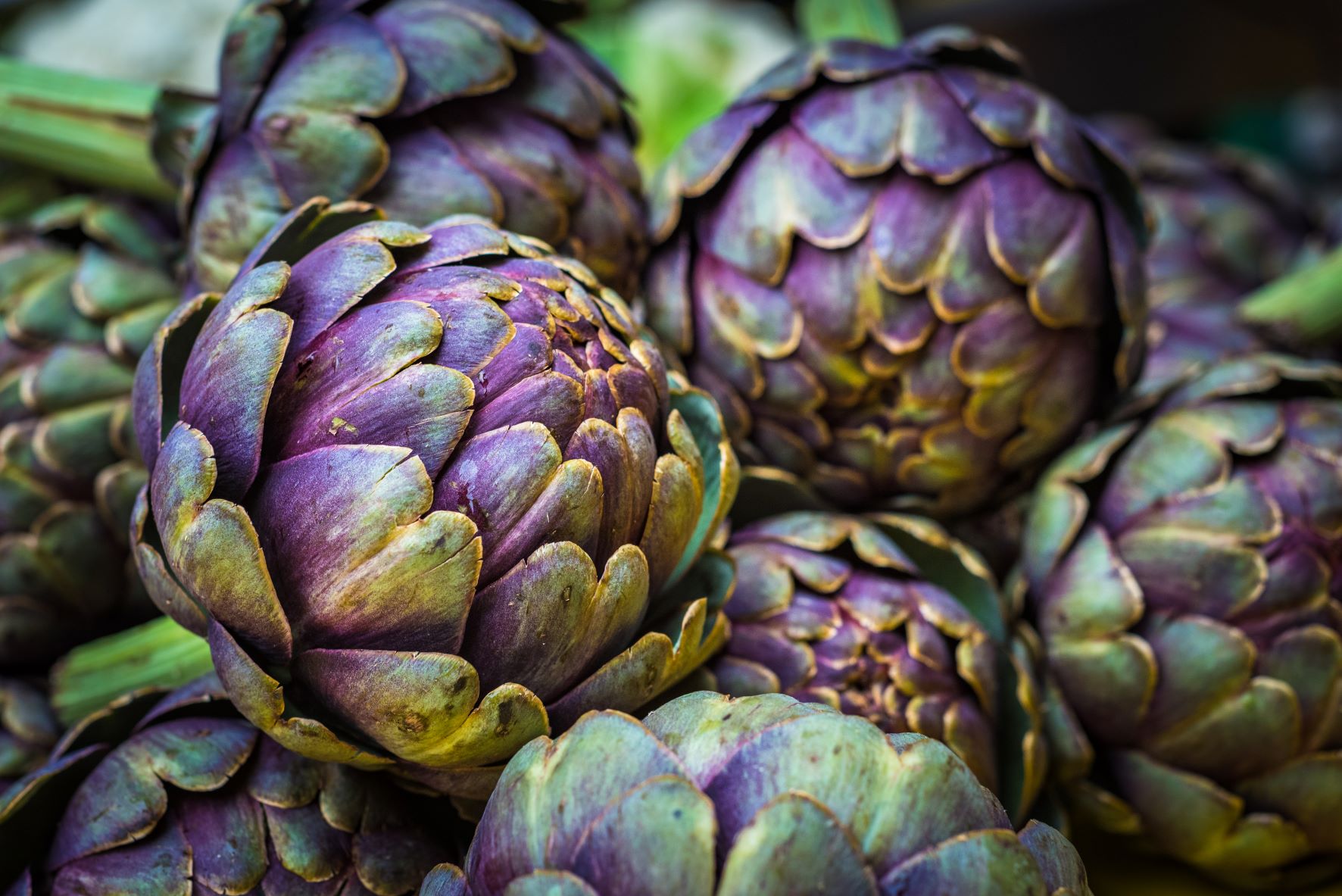
4) Globe Artichokes
Like blueberries, artichokes are one of the foods highest in antioxidants. They're nutrient-dense, high in fiber, and low in calories. But what makes artichokes shine in the detoxification department is that they support the liver in several unique ways.
The globe artichoke is an excellent detoxifier of the liver and gallbladder. Artichokes promote bile flow, reduce triglycerides, bring blood to the liver, and support regeneration. They can help lower LDL (bad) cholesterol while increasing HDL (good) cholesterol.
Two special antioxidants in artichokes, cynarin, and silymarin, are credited with some of these big benefits to liver health. Those amazing antioxidants help protect the liver from damage and help generate new liver tissue. They prevent the buildup of fat and reduce inflammation in the liver, both of which can impair liver function.
Artichoke leaf and silymarin are commonly found in liver support supplements, but simply eating artichokes stimulates the production of bile, which helps flush toxins from the liver.
To eat, steam an artichoke until the leaves pull easily away from the plant (30-60 minutes, depending on size), and then eat the tender parts of the leaves and heart.
Get the Recipe: Steamed Artichokes with Garlic, Lemon & Fennel Aioli
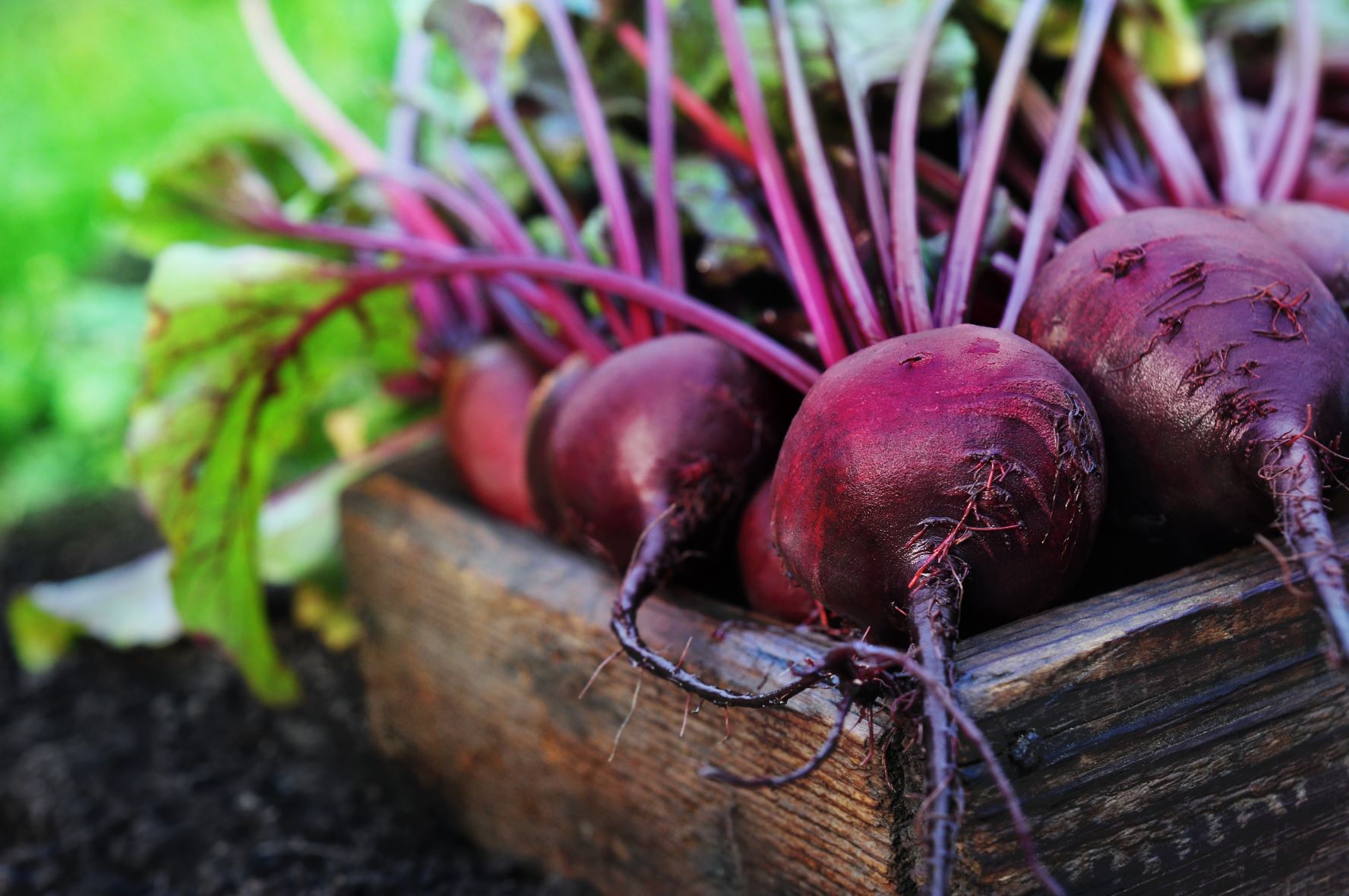
5) Beets
This high-antioxidant, ruby red root vegetable is packed with detoxifying nutrients that help the liver do its best work. One significant component of the beet is betaine, which helps the liver cells eliminate toxins. Also present in beets are betalains, which provide protection against cell oxidation and encourage detoxification.
Studies have shown beets to be an effective therapy for the effects of NAFLD (non-alcoholic fatty liver disease. Also, beets contain pectin, a fiber that clears toxins from the body once they’ve been removed from the liver, so they don’t get reabsorbed.
Beets are versatile and tasty and can be eaten cooked or raw. Add them to soups or salads, juices, or smoothies. They can be pickled in summer or roasted for a warm winter treat. You can even make healthy baked chips with them!
Lots of folks turn their noses up at beets, but when prepared well, they can be SO delicious! Give beets a chance with this recipe for Beet Chips with DF Arugula Lemon Pesto or this delicious and hearty Beef Borscht.
PIN IT!

In Conclusion
Our bodies have an amazing system for removing toxins. The liver, in particular, is your body’s very own waste chemical processing plant. It works tirelessly to detoxify your blood, break down hormones, store essential vitamins and minerals, and produce bile to digest fats.
Supporting the liver and other detox pathways like the kidneys and digestive tract with supportive foods can help them to work as well as they possibly can.
For Thyroid Thrivers, incorporating these five detoxifying foods, along with other colorful, organic, detoxifying whole foods, can help protect our thyroid function and optimize how well our body is able to utilize or convert thyroid hormones. All of this can translate to you feeling your best!
I hope this has inspired you to incorporate even one of these foods today. Your body will thank you for it!
Wishing you the best of health,

P.S. If you're anything like me, when I started down the path of thyroid-healthy eating I had questions-- lots of them. What I didn't have was a step-by-step system, to get me where I wanted to go. I wasted a lot of time piecing together bits of information about what to eat, what to avoid, and HOW to make thyroid-healthy dietary changes. That’s why I created the Thyroid-healthy Meal Plan Kickstart. Ready to take YOUR healing journey farther, FASTER? Let’s do it. Learn more HERE.
Sources:
- https://www.reuters.com/article/us-thyroid-chemicals/study-links-thyroid-disease-to-non-stick-chemicals-idUSTRE60K0PP20100121
- https://www.scientificamerican.com/article/pesticide-use-thyroid-disease/
- https://www.thyroid.org/american-thyroid-association-ata-issues-statement-on-the-potential-risks-of-excess-iodine-ingestion-and-exposure/
- http://drknews.com/goiter-goitrogens-and-thyroid-enlargement/
- https://www.healthline.com/nutrition/10-proven-benefits-of-blueberries
- https://www.ncbi.nlm.nih.gov/pmc/articles/PMC5613902/
- https://avivaromm.com/thyroid-toxins/
- https://www.sciencedirect.com/science/article/pii/S0160412011002716
- http://www.huffingtonpost.com/maria-rodale/whats-behind-the-secret-e_b_2915186.html
- https://www.ncbi.nlm.nih.gov/pubmed/19902160
- https://www.ncbi.nlm.nih.gov/pubmed/8686573
- https://www.ncbi.nlm.nih.gov/pmc/articles/PMC3654245/
- https://pubmed.ncbi.nlm.nih.gov/15489888/
- https://www.ncbi.nlm.nih.gov/pubmed/10404539
- https://www.ncbi.nlm.nih.gov/pubmed/24315931
- https://thyroidpharmacist.com/articles/turmeric-for-your-thyroid-and-hashimotos/
- https://www.ncbi.nlm.nih.gov/pubmed/17569205
- https://www.healthline.com/nutrition/artichoke-benefits
- http://ajcn.nutrition.org/content/80/3/539.full
- https://www.ncbi.nlm.nih.gov/pubmed/11714300
- https://www.ncbi.nlm.nih.gov/pmc/articles/PMC8698622/
Subscribe to my free newsletter for fresh recipes & lifestyle tips, delivered weekly, and receive a free gift!
By submitting this form, you agree to receive ongoing updates from Hypothyroid Chef







